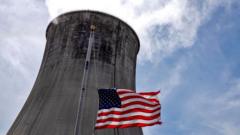China has launched a series of new tariffs against United States imports, including coal and liquefied natural gas, effective next Monday. This move marks a response to President Donald Trump's recent decision to impose a 10% tax on all Chinese goods. Beijing's counter-measures include a 15% tax on US coal and liquefied gas, alongside a 10% tariff on crude oil, agricultural machinery, pickup trucks, and large-engine vehicles.
In its complaint to the World Trade Organization (WTO), China argues that the US actions violate international trade rules. President Trump, however, defends the tariffs, claiming they address trade deficits and are part of a broader strategy to tackle the flow of fentanyl, a synthetic opioid linked to the US opioid crisis, which his administration contends originates from China. China, on the other hand, dismisses this assertion, declaring America’s fentanyl crisis as an internal issue.
In retaliation, China has also expanded its "unreliable entity" list, targeting additional US companies, including PHV Corp, which owns prominent fashion brands like Calvin Klein and Tommy Hilfiger, and Illumina, a biotech firm. The Chinese commerce ministry accused these firms of discriminating against Chinese businesses, stating that entities identified on this list could face significant sanctions, including financial penalties and the revocation of work visas for their foreign employees.
Beijing has further announced the restriction of exports of 25 vital minerals critical to various industries, including tungsten for aerospace technology, tellurium for solar energy applications, and molybdenum used in steel alloy production.
In a related development, a Chinese regulatory body has initiated an antitrust investigation into Google for purportedly breaching competition laws, highlighting the complexities of international business operations amid growing tensions.
While both nations have previously imposed significant tariffs on hundreds of billions worth of cross-border goods, the current situation remains precarious. Recently, Trump temporarily suspended plans for a 25% tariff on imports from Canada and Mexico following negotiations focused on border security and fentanyl trafficking, further complicating trade dynamics among these three significant trade partners.
The ongoing uncertainty regarding President Trump's potential renewal of tariffs could compel businesses to reassess their reliance on US markets, ultimately affecting investments and hiring strategies. As tensions rise, China appears poised to adapt and strengthen its position in this unfolding trade war.



















